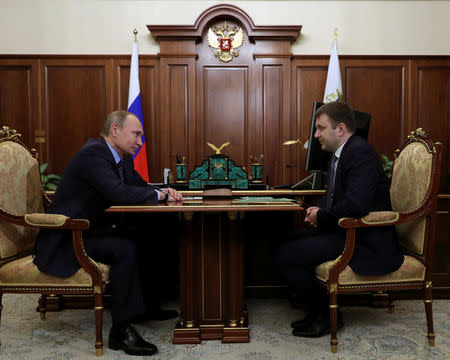Putin names deputy finance minister Oreshkin Russia's new economy minister
By Andrey Ostroukh and Olga Popova MOSCOW (Reuters) - President Vladimir Putin named deputy finance minister Maxim Oreshkin as Russia's new economy minister on Wednesday, two weeks after the post's previous holder was detained and accused of bribery. Alexei Ulyukayev, the ex-economy minister, was accused of trying to extort a bribe from Russian oil major Rosneft, an allegation he denies. He is currently under house arrest. Oreshkin, his 34-year-old replacement, joined the finance ministry in 2013 as the head of the strategic planning department and became a deputy finance minister in March 2015. He was not on a shortlist of candidates being circulated by Russian state media. Putin, who has fired a raft of officials this year to make way for a new generation, praised Oreshkin as a young and efficient expert. Oreshkin told Putin his main task for 2017 was to find measures to spur economic growth. "Oreshkin is a great expert in macroeconomics. I don't know anyone on the market who would be better than him in macroeconomics," Finance Minister Anton Siluanov said, commenting on his deputy's appointment. Oreshkin belongs to a group of young economists who joined the government in the past few years. He started his career as an economist at the central bank in 2002. In 2006, he joined Rosbank, the Russian branch of Societe Generale, before moving on to Crédit Agricole Corporate and Investment Bank. In 2012, Oreshkin joined VTB Capital, the investment arm of Russia's second largest lender VTB. VTB Capital has served as a recruiting pool for finance ministry experts in recent years. Another deputy finance minister, Alexei Moiseev, and the head of the strategic planning department, Vladimir Kolychev, both worked for the bank before becoming government officials. Siluanov said on Wednesday he hoped the appointment of his former deputy would help speed up cooperation between the two ministries. The two often clash, with the economy ministry calling for more growth and the finance ministry seeking to keep the budget deficit down. "The key is to have common ideas, plans, policy. There always will be some debates ... But I think that now we will be finding common solutions faster and more easily," Siluanov told reporters. (Writing by Andrew Osborn/Katya Golubkova; Editing by Jeremy Gaunt)


